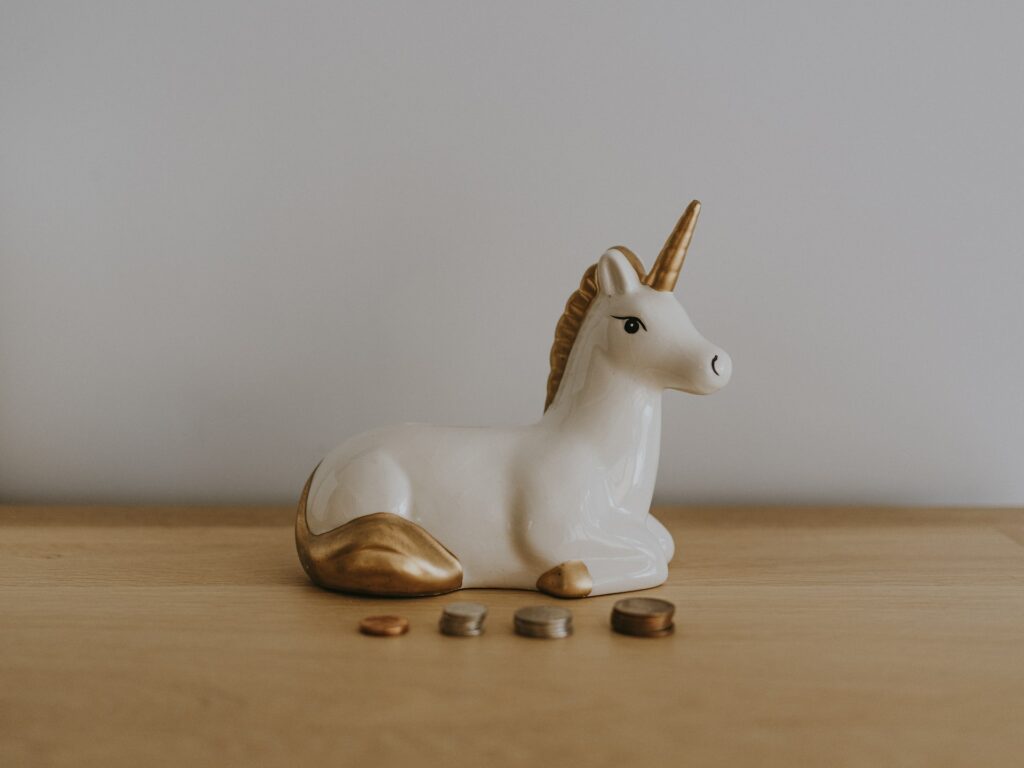Our fascination with the unicorn has not escaped any generation or any contemporary decade since the 1980s. The first time I was confronted with a unicorn was through the movie The Last Unicorn. As a child, this was a beautiful, enchanting story.
Today, when I talk about a unicorn, I am talking about a startup company with a valuation of more than one billion dollars. Whereas in my youth this was something special and almost unattainable, today in the startup world you are really impressive only if you have reached a ten-billion dollar valuation and can call yourself a decacorn. The reasons for this are relatively simple; the low-interest phase of recent years, the oversubscribed venture capital funds and their sometimes ludicrous investment sums caused unicorns to sprout like springtime flowers.
In nature, blooming flowers equally attract weeds. This rather unpleasant consequence can be observed in the world of investors too.
Unicorns have become as rare as a McDonald’s restaurant downtown. The next big thing is discovered every day and comparisons are drawn with digital pioneers like Facebook, Google or Apple. But for whom exactly are they making the world a better place? More likely for themselves. Some founders would have been better off following Google’s code of conduct, “don’t be evil.” Interested in a concrete example? Sam Bankman-Fried.
The fall of crypto exchange FTX and its founder
If you are not too versed in the field of entrepreneurship and startup rounds that name would probably not immediately ring any bells. But you might have heard of his company before – even without being a Miami Heat fan. Sam founded the crypto exchange FTX, a company backed by world-renowned VC funds Sequoia, Paradigm, Tiger Global, Softbank and valued at $32 billion until two weeks prior to its collapse. Here came a Decacorn on steroids.
“This is fraud,“ stated Alesia Haas, CFO of Coinbase, in an interview with the Wall Street Journal. The reporter had asked her if this was the ‘Lehman moment’ for the crypto industry, to which she replied in the negative. What exactly had happened? Was it really not comparable to the collapse of Lehman Brothers?
The Lehman Brothers bankruptcy is closely linked to the 2008 financial crisis – triggered by the collapse of the U.S. housing market – thanks to, you guessed it, mortgage-backed securities. The unbridled development of this financial market product resulted in a global economic crisis, eventually leading to the bankruptcy of the investment bank Lehman Brothers in 2008.
This expansion was attributed to the greed of individual Wall Street bankers, despite calls for a more intensive regulation of the banking system. A single person or a group of people calling themselves Satoshi Nakamoto wrote a white paper, bringing the bitcoin blockchain protocol to this world – and unintentionally planting the seed of a new financial bubble in the process.
Unveiling the donkeys of crypto
The idea of a decentralised financial system was as simple as it was ingenious. Banks were to become obsolete, all power returned to the community. The beginning of a new era. But for several years, little or nothing happened. There was no figurehead, no one to inspire people with the idea.
In 2015, these people slowly but surely began to appear on the main stages of startup events. They no longer appeared with gelled hair and suspenders, like the investment bankers of the 80s; the audience of those events started to listen to young men in hoodies and flip flops, bringing academic excellence and loads of new ideas about marketing cryptocurrencies. They presented the latter as an investment opportunity rather than as an alternative to the fiat money of central banks. An investment opportunity that meets the zeitgeist – digital and, above all, associated with a high yield.
Crypto investments became the measure of all things, CEOs became rock stars, and hardly a day went by without an ICO being announced as the next big thing. At some point, the highly pushed Unicorns and Decacorns could no longer live up to the expectations of the investors or their own.
Driven by desperation or overestimation of one’s own capabilities, the number of fraud cases started to increase. FTX was back then the tip of a much bigger iceberg: the company gambled with its own branch valued at 10 billion dollars in order to fulfil the above-mentioned high expectations – nothing else than a Ponzi Scheme.
Making a case for purposeful start-ups
What’s next? Similar to the Lehman bankruptcy, FTX’s mishap is certainly not an isolated case. The whole of Wall Street was affected by the subprime crisis, and consequently the worldwide banking system. Some got off lightly, others were simply bought out. The same is likely to happen to the crypto industry – the bubble would burst and some companies would be dragged into the abyss. But if it has taught us one thing, it is that not all entrepreneurs are driven by greed and easy money, but fundamentally, by purpose.
This article was originally published by ESCP’s Executive Master in Digital Innovation and Entrepreneurial Leadership.
Authors
Marcus Schmalbach (MBA / PhD) is the founder and CEO of RYSKEX GmbH headquartered in Hartford, Connecticut. He has a long-standing experience in risk and insurance management in various industries. Before the founding of RYSKEX he was Head of German MBA program located in Cologne, Germany. He is working as a professor at ESCP Business School, Berlin on innovation matters with a research focus on the impact of blockchain technology and artificial intelligence on the finance industry.
Manon Delespierre, Recruiting and Admissions Manager, Executive Master in Digital Innovation and Entrepreneurial Leadership
This post gives the views of its authors, not the position of ESCP Business School.
